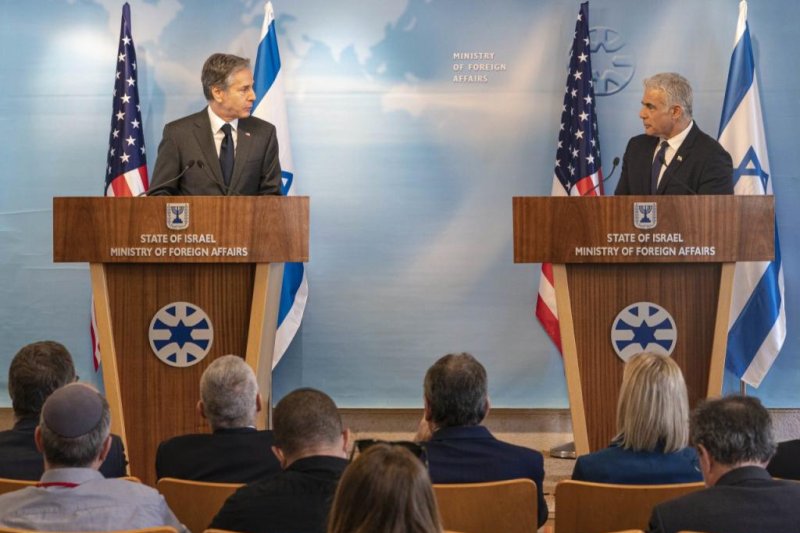U.S. Secretary of State Antony Blinken met Sunday with Foreign Minister Yair Lapid of Israel and leaders from four Arab countries in Jerusalem to kick off a trip intended to revive Iran nuclear deal negotiations. Photo courtesy U.S. State Department/Twitter
March 27 (UPI) -- U.S. Secretary of State Antony Blinken met Sunday with Foreign Minister Yair Lapid of Israel and leaders from four Arab countries in Jerusalem to kick off a trip intended to revive Iran nuclear deal negotiations.
Talks to finalize the nuclear agreement were paused in recent weeks amid the Russian invasion of Ukraine but U.S. officials have warned that Iran is just weeks away from being able to produce enough material needed to make a nuclear bomb.
The administration of former President Donald Trip withdrew from the Joint Comprehensive Plan of Action, the previous Iran nuclear deal signed in 2015 by the United States, days before a deadline to recertify the accord in 2018.
President Joe Biden's administration seeks to return to the deal, which would restrict Iran's nuclear program. But Israel, a major ally of the United States, fears that doing so would strengthen rival Iran.
"When it comes to the most important element, we see eye-to-eye. We are both committed, both determined that Iran will never acquire a nuclear weapon," Blinken said during a joint press conference held with Lapid.
"Russia's aggression against Ukraine is another reminder of why this is so important: an Iran with a nuclear weapon or the capacity to produce one on short notice would become even more aggressive and would believe it could act with a false sense of impunity."
However, Blinken said the United States remained under the belief that a "full return to the implementation" of the 2015 nuclear deal "is the best way to put Iran's nuclear program back in the box that it was in."
"This cooperation is essential because, beyond its nuclear efforts, Iran continues to engage in a whole series of destabilizing activities across the region and beyond -- indeed, those activities have also multiplied since our withdrawal from the JCPOA -- via proxies and by Iran itself," Blinken said.
He added that "terrorist attacks" have been carried out by Iran-backed Houthis on civilian infrastructure in Saudi Arabia and the United Arab Emirates.
Blinken said the Biden administration would also seek to strengthen stability in the region through cooperation established by the Abraham Accords, which were brokered by the Trump administration.
Along with Israeli officials, Blinken is scheduled to meet with three countries that are part of the Abraham Accords -- the UAE, Bahrain and Morocco -- at the Negev Summit diplomatic event.
Lapid, in comments made during the press conference, called the United States "Israel's closest friendship and strongest alliance" and said that the two countries share a vision of "peace through strength."
"Regarding the Iranian issue, Iran is not an Israeli problem. The world cannot afford a nuclear Iran. The world cannot afford for the Iranians' Revolutionary Guard Corps to continue spreading terror around the globe," Lapid said.
"We have disagreements about a nuclear agreement and its consequences, but open and honest dialogue is part of the strength of our friendship. Israel and the United States will continue to work together to prevent a nuclear Iran," he added.
During the press conference, Blinken also walked back comments Biden made during a speech delivered in front of the Royal Castle in Warsaw on Saturday.
In his speech, Biden criticized Russian President Vladimir Putin and said he "cannot remain in power" in comments which appeared to condone a regime change.
"With regard to the president's incredibly powerful speech yesterday, I think the president, the White House made the point last night that, quite simply, President Putin cannot be empowered to wage war or engage in aggression against Ukraine or anyone else," Blinken said Sunday.
"As you know, and as you've heard us say repeatedly, we do not have a strategy of regime change in Russia or anywhere else, for that matter. In this case, as in any case, it's up to the people of the country in question. It's up to the Russian people."















